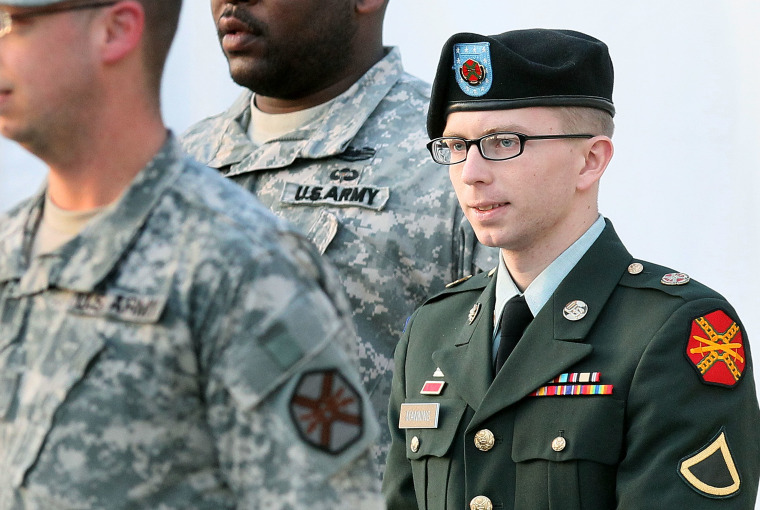At the heart of the Obama administration's aggressive stance on leak investigations lies a single, unprecedented case that could test the limit of the government's ability to control information and punish those who disseminate it.
When the court martial trial of Private First Class Bradley Manning begins June 3at Ft. Meade, Md., the 25-year-old will stand alone, accused of aiding the enemy when he provided thousands of classified documents to Wikileaks. Manning was arrested three years ago and spent nearly the entire first year in solitary confinement. If the Obama administration had hoped Manning could be pressed to name accomplices, it didn't work. No one else has been charged. Julian Assange, the Australian-born founder of Wikileaks which published what became known as the "Manning trove," was granted asylum by the Ecuadorian government and resides in that country's embassy in London.
Wikileaks' acquisition in January 2010 of the documents, including secret diplomatic cables and a video that showed U.S. soldiers shooting at unarmed civilians in Iraq, became the first test of leaks and publication challenges for President Obama.
His administration reacted with fury, unsuccessfully urging news organizations not to publish some material, claiming that it had caused serious harm. It forbid government employees without proper clearances from reading the documents online or in newspapers. Even students were told to stay away from the classified information if they hoped to secure government jobs later which required high-level security clearances.
In many ways, that atmosphere of fear and punishment set the stage for the situation the administration finds itself in today: prosecuting more leaks cases than all of its predecessors combined and under fire for seizing reporters' records in secret.
Questions and concerns were raised early on in the Manning case when he was placed in isolation at a marine base in Quantico, Va. P.J. Crowley, the State Department's spokesman at the time, was forced to resign after calling the government's treatment of Manning "counterproductive and stupid." Obama defended the military's decision to keep Manning alone in his cell for 23 hours a day, saying at a March 2011 news conference that he'd been assured the conditions of his incarceration were "appropriate."
The government has argued that the release of the material, none of which was classified as "top secret," damaged U.S. diplomatic efforts and endangered individuals who had spoken with American representatives. It has also launched a years-long, unsuccessful effort to officially tie Assange to Manning. While the United States has been unable to charge Assange with any crime related to Wikileaks, he is wanted in Sweden for questioning over sexual assault and rape accusations. He has denied the allegations. When Britain was set to extradite him, Assange sought refuge with the Ecuadorians who have shielded him for more than a year.
This has left Manning on his own. He faced 22 charges, 10 of which he plead guilty to lesser included charges in February of this year. He faces life in prison if he is convicted of aiding the enemy, the most serious offense. The government has argued that Manning effectively provided support to al Qaeda and other terrorist groups because they had access to the Wikileaks documents online. The judge in the case, Colonel Denise Lind, has ruled that this interpretation is too broad and that the government must prove that Manning intended to cause harm when he leaked the documents.
In a pre-trial hearing, Manning said in a statement that he contacted both the Washington Post and the New York Times before turning to Wikileaks.
The government has charged Manning under the Espionage Act of 1917, a law that has been used to prosecute officials for leaking information to the press only three times before the current administration took office. The Obama Justice Department has prosecuted six people under the act, including the State Department contractor accused of leaking to Fox News reporter James Rosen. The DOJ also secretly obtained two months worth of phone records for 20 phone lines from the Associated Press.
"It does seem like the administration has reacted to the Manning situation and been influenced significantly by it," Joel Kurtzberg, a lawyer who deals with First Amendment and media cases, told msnbc. "The administration has been pursuing leakers in a way that is more aggressive than any in history, and it’s doing so in a way that will almost certainly chill reporting on important issues of public concern."
The contents of the leaked material is widely known, but the proceedings have so far remained obscure. There is no public docket of filings in a court martial and no official transcripts exist, even for hearings that were open to the public. In April, a military appeals court rejected a case brought by the Center for Constitutional Rights on behalf of journalists seeking access to court documents. The Center filed a civil complaint in Maryland in May. "The legitimating function of openness is as important as its role in making proceedings more likely to arrive at accurate outcomes," the Center's complaint read.
The prosecution is expected to call up to 150 witnesses over the course of three months, and two dozen of those will testify at least in part in closed sessions in order to safeguard classified material. "Because Manning pled guilty to the leak already, that should reduce the need for secrecy at trial," Ben Wizner, Director of the Speech Privacy and Technology Project at the American Civil Liberties Union told msnbc. "The government doesn't need to talk about sources and methods" while attempting to prove guilt.
"If Manning were convicted of these charges based on evidence that the public didn't see," Wizner says, it would have a major chilling effect. "The question for public is how do you measure Bradley Manning's violation of the rules against the public benefits and alleged harms of his disclosures."
